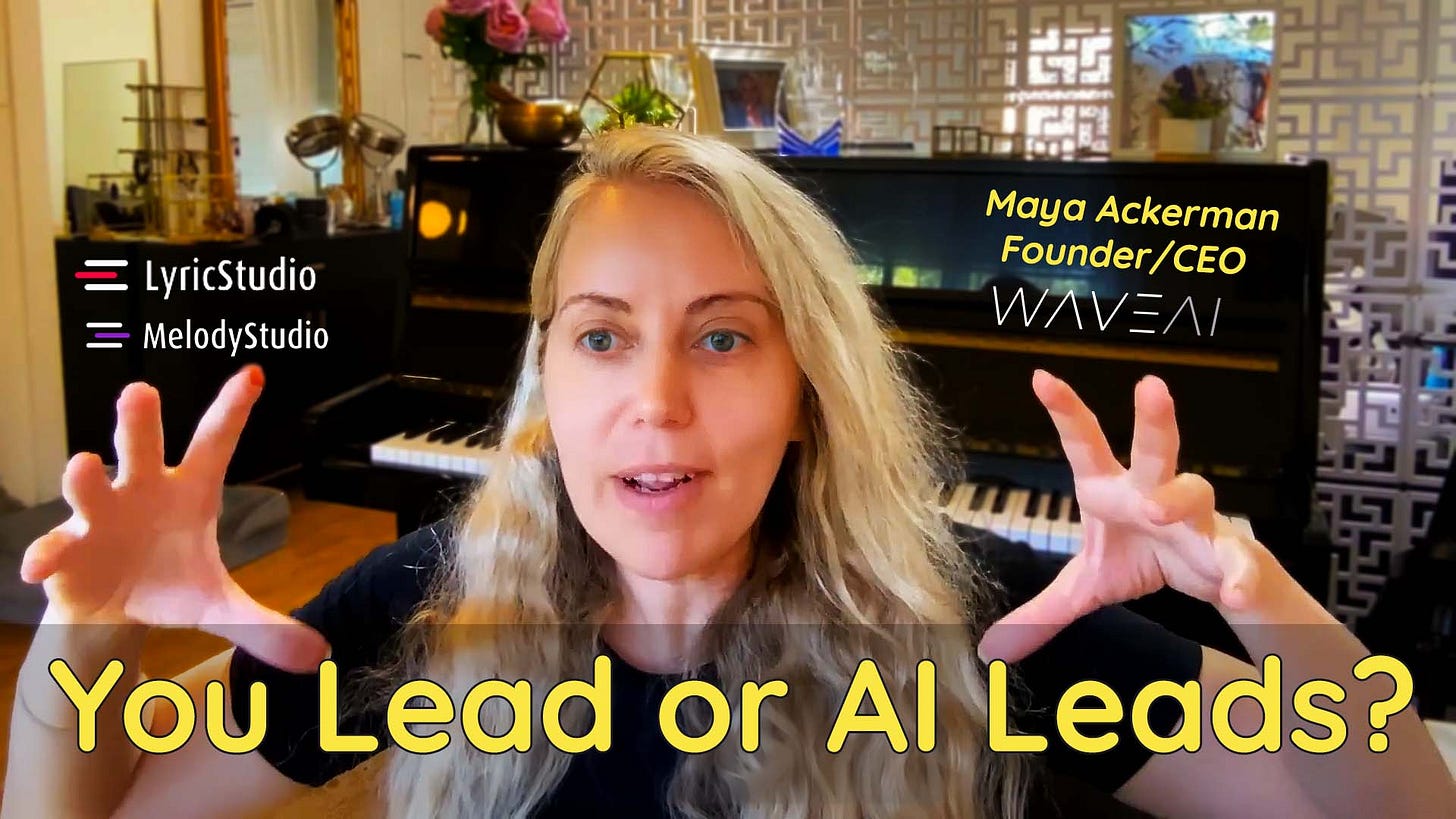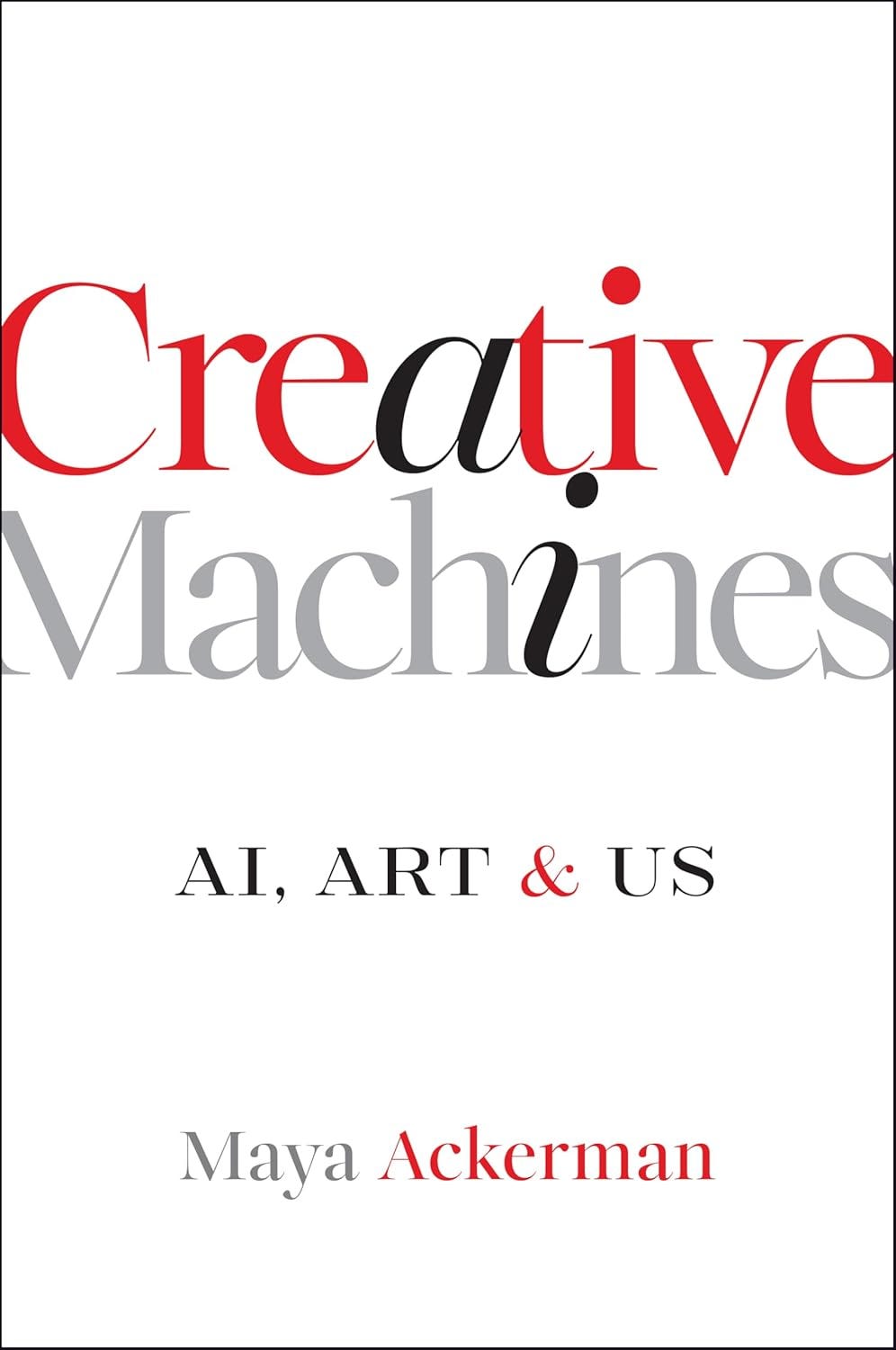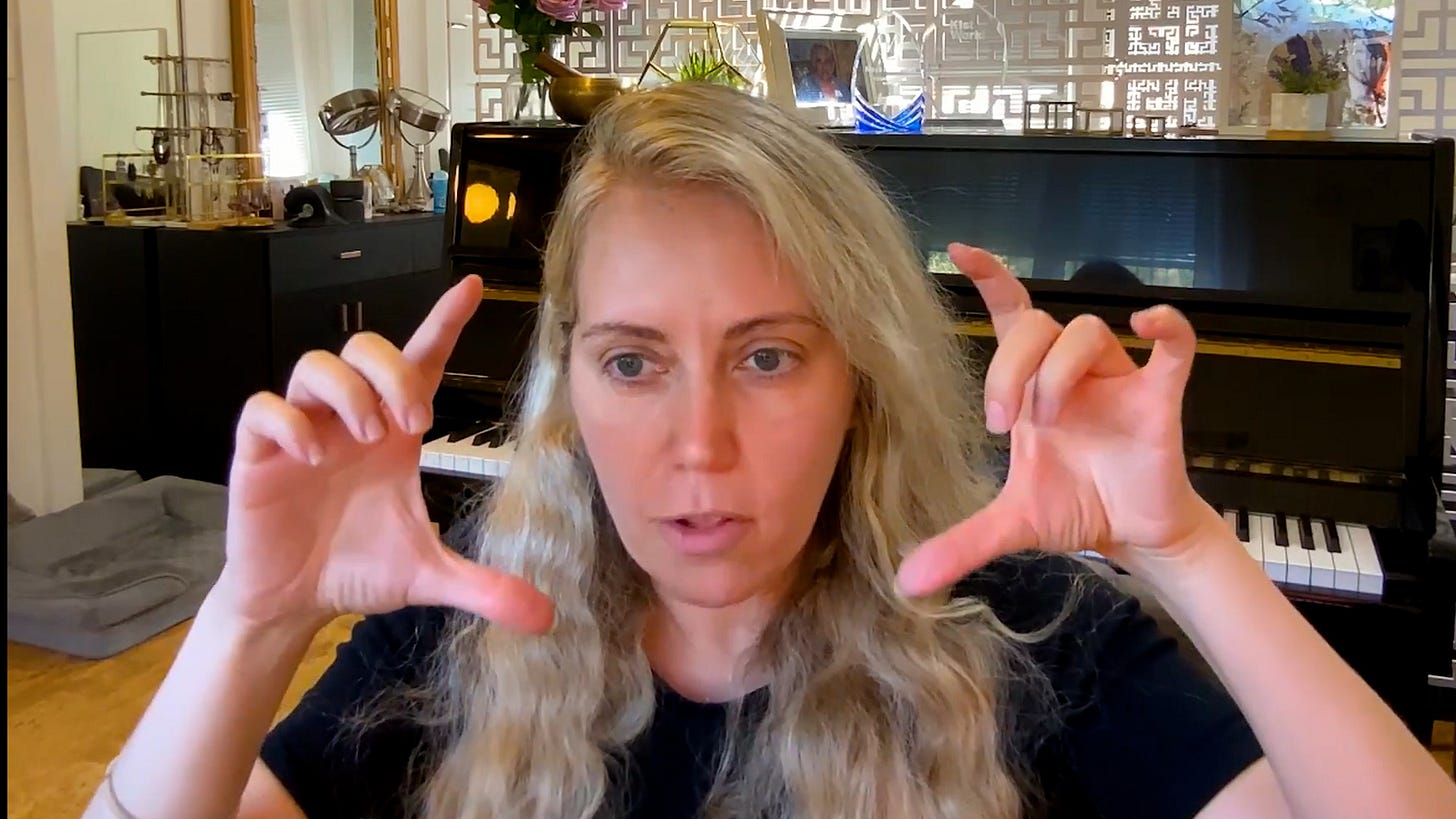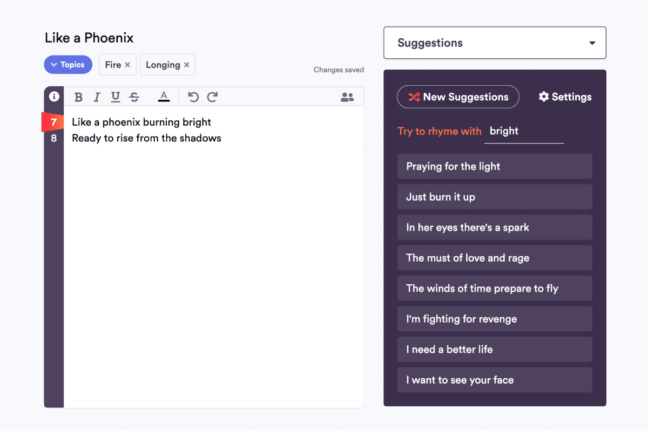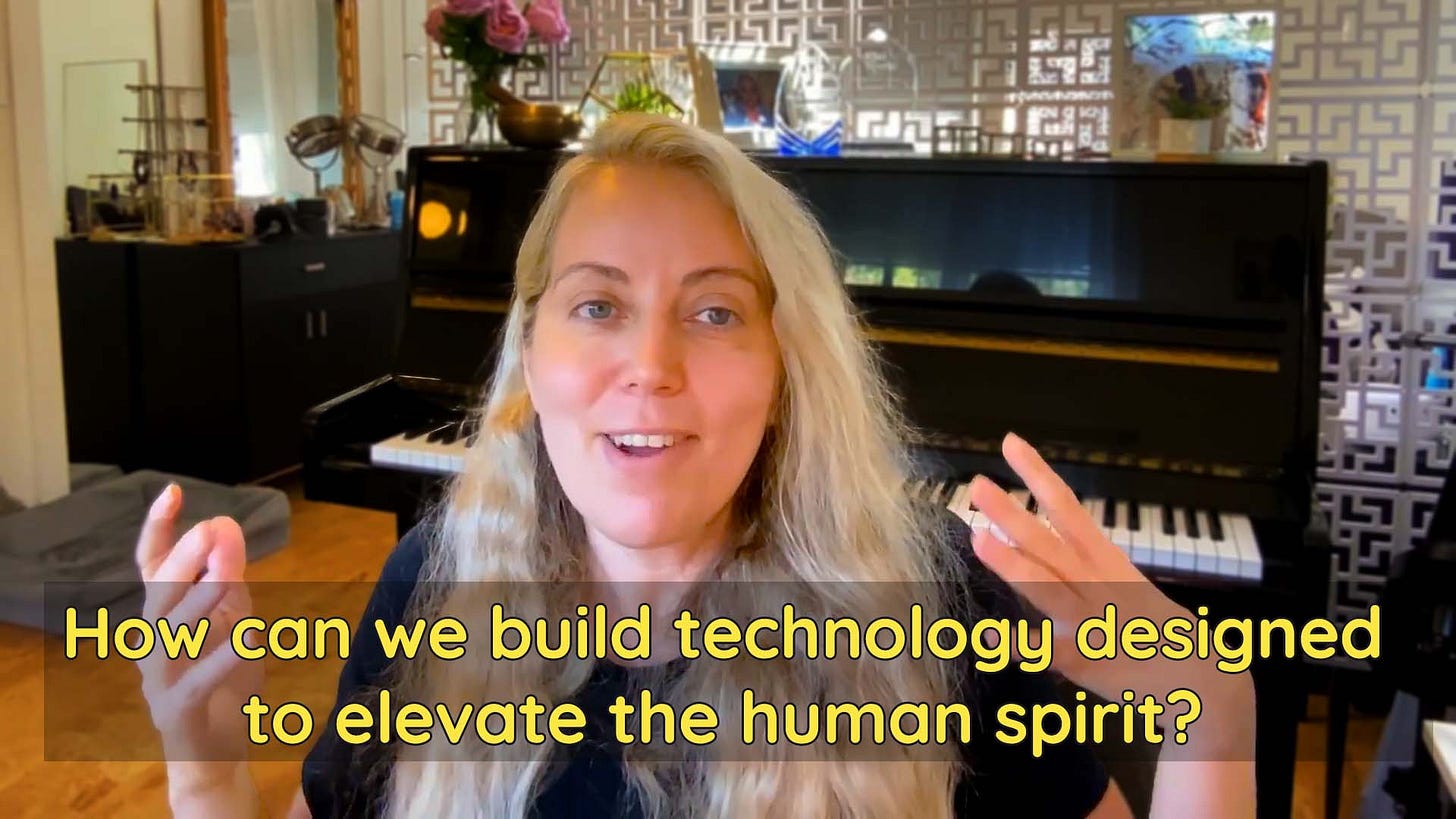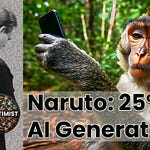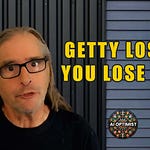As AI Hype dissolves into mainstream cringe, it’s easy to forget that the gems are found below the surface jargon and PR blather.
Like Maya Ackerman, founder and CEO of WaveAI since 2017, helping people write lyrics and make music without breaking the rules. Or stealing other’s music!
Creating emotional connections, inspiring discovery, AI designed to release that creative feeling, focusing on human creativity instead of the AI Roulette wheel:
“We should be thinking, how can we build technology?
How can we build an LLM or a different kind of model designed to elevate the human spirit? And there are ways to do this.
We just need to expand our imagination.”
Maya Ackerman
Over a million songs have been created with of WaveAI since 2018. Including a few big hits and several quiet relationships with major players who face backlash for exploring an AI future that empowers musicians.
Maya Ackerman built her company to work completely differently than what investors wanted or what her competitors – Udio and Suno - deliver.
AI tools that make you better
While most generative AI tools function like "rotating roulette wheels of content" - spin the wheel, get random output - Maya delivers on a different vision.
As an opera singer and musician herself, she experienced firsthand how AI elevates her own creative process, not replace it.
"My songwriting abilities blew up," she told me about her first encounter with an early AI prototype.
"I went from being a certain level in songwriting to being three times better instantly."
That personal breakthrough led to WaveAI - a platform helping both skilled and beginner musicians craft songs and lyrics. Easy to use and affordable.
And the technology isn't built to be bought out or go IPO. It's built to elevate creative skills in humanity, in people.
Eight years after starting, Maya is still aligned with this vision, even when it means moving away from what the investment world wants.
How Does AI Elevate Creativity: Who's Really in Control?
Maya laughs when framing what's wrong with most AI tools today:
"If ChatGPT is a god when you use ChatGPT, then when you use Lyric Studio, you are the God."
Think about how you interact with most AI. You prompt, it produces. You ask, it answers.
The AI is the oracle, you're the follower. And Maya knows this approach fundamentally disempowers users.
Curtiss King, who had a No.1 hit on iTunes via an album made with LyricStudio, said that it’s like lightning in a bottle.
“It enables you to capture this kind of inspiring moment, but also stay in ‘flow’ – to stay solidly in this creative space.
You can get out this inspiration onto paper or onto your monitor before it fizzles away.”
Curtiss King
Maya’s insight from her upcoming book "Creative Machines" cuts to the heart of it:
"I now see that AI has always been - and will always be - all about us."
This isn't just philosophy - it's a completely different business strategy. While companies like Suno and Udio pitched investors on "human-free Spotify," Maya forged her own path.
"The reason that you see Suno and Udio make it so simple and so efficient is because that's what investors wanted.
They wanted a replacement model," she explains.
She respects their tech, but the AI divide is clear.
When you build AI to replace people from day one, that intent gets baked into everything - the algorithms, the interface, the user experience.
When you build to elevate people, that's a fundamentally different architecture. Results come from intention as much as doing the work.
She’s building a creative force that helps musicians grow, sometimes where they don’t even need to use her tools anymore….which is awesome!
Breaking the Average: AI that adapts to your style
Most AI systems optimize for the most likely outcome - they head toward the average, the safe choice.
"We don't take it towards the mean.
We don't give you the most likely outcome because we're trying to help you be creative."
Instead of serving up what's most probable, Wave AI intentionally offers low-probability responses that aid and challenge the musician.
It's literally programmed to provide divergent, unique results rather than predictable ones.
The interface tells this story too. No prompt box asking what you want AI to create. Instead, "a big empty text box" that immediately signals: you're writing.
The AI suggests and supports, but you're driving.
"The suggestions are divergent, so they don't all take you to the same directions.
There is no right way to write your lyrics."
When Humans Stay in Charge: Songwriting AI that teaches
Helping to create a million songs is impressive. Learning how people use your technology and adapting is where this radically improves.
Take Sky Jordxn, using Wave AI in a way Maya, and AI, never anticipated.
"Sky Jordxn has a whole playlist of videos... it just blew my mind.
In the early days, Jordan would turn on his beats, click generate as the music played, and improvise rap lyrics in real time using AI suggestions.
"He would sort of improvise his rap with Lyric Studio on top of the beat in real time and create music like that."
Or Curtiss King, a professional who uses Wave AI to enhance, not replace, his process.
"When professionals like Curtiss can use Lyric Studio, a lot of the lines just come out from them.
They only use Lyric Studio to the extent that they want to."
The creative AI pattern is clear: when you design AI to support rather than replace, people find ways to use it that surprise even the creators.
Sure it’s great, but can it create an Italian Aria?
Arido Taurajo - the Italian Aria created with help from early WaveAI
James Morgan, a San Jose State art professor, always dreamed of writing an opera. Problem: no musical experience, doesn't speak Italian.
During her early research days, Maya took a walk with Morgan through the San Jose State campus.
Beginning to create WaveAI, she asked Morgan about that Italian opera idea, and she had a twist.
They could retrain their AI music system on public domain Italian works, like Puccini.
The setup was simple: feed it Italian lyrics, get back different melody suggestions.
Remember, Morgan has no music experience or background, though extremely creative. Trying to create an Italian aria without knowing the language:
"The guy creates Arido Taurajo, this amazing Italian aria,"
Dr. Ackerman says, still amazed. The piece got showcased in galleries, with Dr. Ackerman herself singing parts of Morgan's creation.
This wasn't AI generating an opera. These were two humans using a tool to leap over impossible gaps - language barriers, musical inexperience, technical limitations - to create something genuine, personal and beautiful.
"You give somebody a fairly basic AI tool and they can go out and create something," she reflects. "A non-musician who doesn't speak Italian could create a beautiful Italian aria."
AI Elevates Creativity: The Counter-Intuitive Business Model
Being a founder means sometimes not wanting to admit a good thing. Maya is finding that some Wave AI users actually stop paying - not because they're dissatisfied, but because they've gotten good enough that they don't need the tools anymore.
"Some of our users stop paying for our products because they have become better songwriters.
They got to where they want to go. And I think that's fantastic."
It's the opposite of the typical tech playbook focused on user addiction and lifetime value optimization.
WaveAI is literally building itself out of some customers' lives - and celebrating it.
"The way to make a successful product with AI is to have it give real value and elevate the user and help them learn and help them grow, not just foster addiction and dependence."
Standing Up to the AI Hype
As generative AI grows and big moonshot companies grab headlines, will any of this stand the test of time?
"How can we build technology designed to elevate the human spirit?
There are ways to do this.
We just need to expand our imagination."
This requires breaking free from the science fiction narratives shape investor thinking.
"The narrative has really crystallized into this autonomous intent field evil thing that ultimately wants to kill us and replace us," she observes.
Still at every level, we can choose differently. Investors don't have to fund replacement models.
Builders don't have to create black box oracles. Users don't have to accept being told what to do, how to do it, and losing control.
The Long Game: How can AI make us more human?
Dr. Ackerman's first principle, laid out in her upcoming book "Creative Machines":
"The greatest impact creative machines can have is to elevate human creativity."
This isn't about making AI less powerful. It's about designing that power to serve human thriving instead of human replacement.
"How can AI make us more human?
How can it help us connect deeper with our emotions, connect more deeply with each other, and connect more deeply with our creative capabilities?"
The answer lies in what she calls "humble creative machines."
AI systems built to put humans in charge, to adapt to users rather than forcing users to adapt to them.
When James Morgan created his Italian aria, he wasn't just making music. He was proving that the impossible becomes possible when technology is designed with the right intent from the ground up.
While everyone else is building roulette wheels, Maya and the team at WaveAI is building something different: tools that make you more creative, not more dependent.
And in a world racing toward AI that does everything for us, maybe that's exactly what we need.
Resources
Creative Machines: AI, Art, and Us (Maya's Book)
Arido Taurajo by James Morgan with help
from an early version of WaveAI
How LyricStudio Pro Helped Me Get Out Of A Writer’s Block
AI Optimist Playlist (Shorts and Sections)



